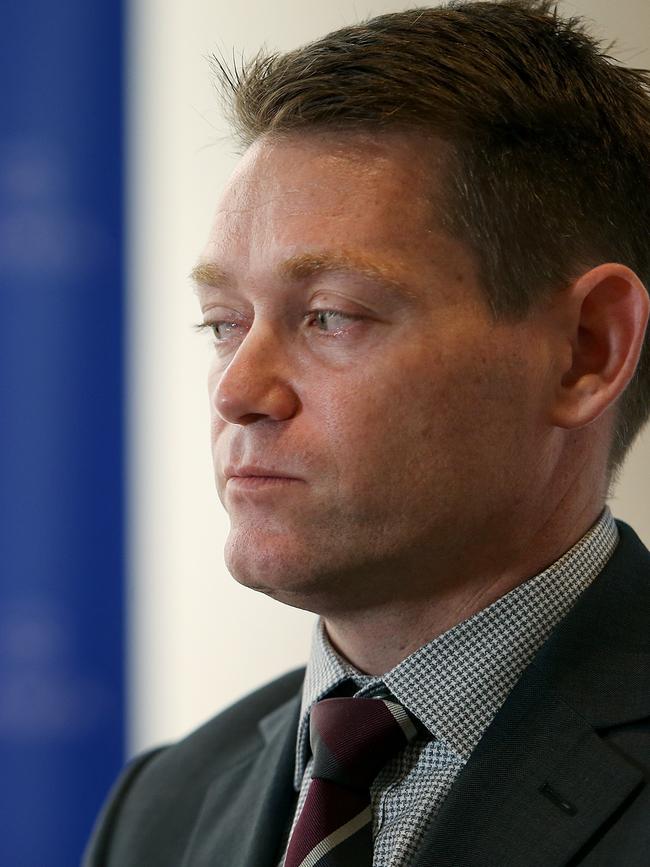NTG’s Local Court stop gap ‘could undermine judicial independence’, Bar Association warns
Moves by the NT government to plug gaps in the Territory’s court system have the potential to undermine the independence of the judiciary, the NT Bar Association has warned.
Police & Courts
Don't miss out on the headlines from Police & Courts. Followed categories will be added to My News.
MOVES by the NT government to plug gaps in the Territory’s court system have the potential to undermine the independence of the judiciary, the NT Bar Association has warned.
Local Court judges, known as magistrates outside the NT, are usually appointed for life to avoid any possibility, or perception, of government interference in their decisions through threats to their ongoing employment in the plum role.
But the NT government has appointed three acting judges on short term contracts and advertised for another position in a bid to take up slack created by existing judges’ leave entitlements.
NT Bar Association president, Duncan McConnel SC, said “it does undermine the independence and the perception of the independence of the judiciary”.
“If you have people in the role who don’t have security of tenure then you have a perception that they don’t have the necessary independence,” he said.
“If the only way they can take leave is by temporarily appointing someone else, then that’s wrong, and what it really says is that they need another judge.”
Mr McConnel said the issue would be of particular concern in cases in which the NT government is being sued or prosecuted, or that touched on government policy, such as litigation involving the mining industry.
“For example, WorkSafe prosecutes work health and safety breaches and the fines in those can be massive,” he said.
“If it comes up before a temporary magistrate, do they have the necessary independence for someone to feel confident that the judge is going to hear a prosecution impartially?”
Mr McConnel said the majority of Local Court judges’ work was in petty crime and while there was no indication of any bias in any previous decisions, the situation remained “undesirable”.
“It’s undesirable to have temporary appointments where you’ve got perceptions around how judges might behave and whether, by only being there temporarily, that might create a tendency to support the government of the day on law and order issues, if law and order issues are biting in the community,” he said.
“When those boundaries get compromised or fudged then you get an undermining of confidence by the general public so it’s just one of those things that you just have to preserve.”

Last month the Victorian government abandoned a proposal to appoint temporary magistrates following backlash from the legal community, with one senior source describing it as a “terrible idea”.
At the time, University of South Australia law professor, Joe McIntyre, said “such appointments effectively hang the sword of Damocles over the temporary judge’s head”.
“It is well recognised that such models can create threats to judicial independence: temporary judges may aspire to full-time positions, creating a risk that they may distort their judicial performance to further such an opportunity,” he said.
“Such appointments effectively hang the sword of Damocles over the temporary judge’s head — keep the government happy if you want to have your job renewed, or be promoted.”
The Victorian Department of Justice had advertised for magistrates on a three-year contract but a spokeswoman later said the ad was published by mistake.
“Under legislation, the appointment of magistrates is until they attain the age of 70 years,” she said.
“A magistrates expression of interest recruitment campaign launched online and in print last year in error referenced an appointment duration of two to three years, which was subsequently corrected to state the role as ongoing, and re-posted to reflect the standard duration for magistrates appointments.”
A Courts NT spokesman said there were currently three acting judge positions in the Local Court.
“One is covering for a judge on long leave pending retirement, another is for a judge who has been seconded to the Supreme Court and the third is to cover for other long leave and the responsibilities of the Coroner dealing with the (Kumanjayi) Walker inquest,” he said.
“The appointment protocol dictates that prior to any appointment, the position must be advertised, even if it would normally be regarded as an extension, such as in the case of the judge seconded to the Supreme Court, who has been extended in that position.
“A further judge will be taking long leave from September, so a fourth acting position is being advertised. There are no retired judges living in Alice Springs that could be appointed there.”



